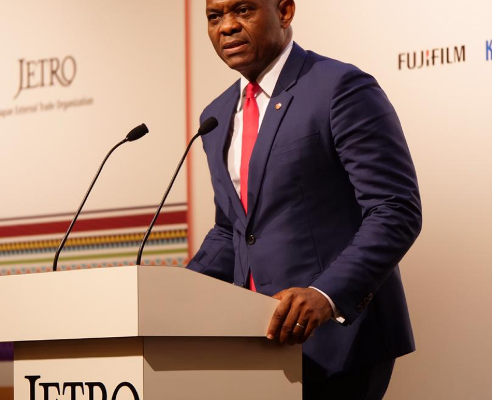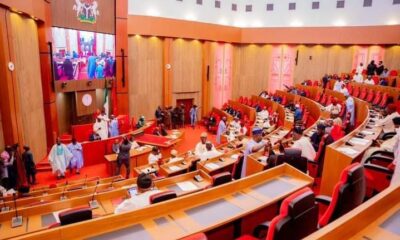NEWS
Union Tells Tinubu To Appoint A Non-physician As Health Minister
The Joint Health Sector Union, JOHESU, has asked President Bola Tinubu to appoint a non-physician health minister even though it opposes the sale of teaching hospital facilities to private profiteers while the review of ministerial nominees continues.
Mathew Ajurotu stated to other medical professionals that the sale of the teaching hospitals will negatively effect their emoluments contrary to their perceptions in a letter to the President signed by the Acting National Secretary for the National President, JOHESU, and AHPA.
JOHESU argued that the salaries of 20% of the sector’s workers, which account for 60% of the personnel expenditures for the overall health staff in FHIs, are not served by the sales of Federal Health Institutions.
The health workers called for caution on the part of other medical professionals who have been assured that the sale of the facilities won’t affect them.
JOHESU/AHPA said that despite constituting 20 per cent of the total workforce in the sector, it is certain that private profiteers will fire them given reducing overhead costs.
According to them and the Assembly of Healthcare Professional Association, AHPA, those advocating for concessionaires are avaricious and would increase the healthcare problem and indexes.
The group pleaded with well-meaning Nigerians to take action and prevent the Federal Government from privatising the FHIs.
The letter further states: “Conscionable Nigerians should assist the Federal Government to be decisive in taking a position that the profiteers, concessionaires, greedy entrepreneurs and their collaborators in Government jostling to take over the FHIs be responsible enough to build their world-class health facilities like their presumed equivalents do in the global arena.
“Even in Nigeria today, we have a few tertiary hospitals like Duchess and Reddington Hospital which continue to make footprints in the sands of our evolving healthcare dispensation.
“In Lagos State, where the privatisation of healthcare was kick-started by these same dramatis personae, the experiment has failed. The privatised pharmacies which were about six at inception have failed in at least four of the centres at huge losses to the Lagos State Government, LASG.”
At the Federal level, the commercialisation of the Pharmacy facility of the University College Hospital, UCH, Ibadan, collapsed and the concession of Garki Hospital, Abuja, has never been a value-added decision.
Today, that facility is a shadow of itself, as it has become inaccessible to a wide range of consumers of health in the Abuja area.
“We therefore strongly urge the Federal Government not to contemplate the privatisation of Teaching Hospital facilities to private profiteers. We must seize the discourse to advise other health professionals who have been promised that the concession of these facilities will not affect them to be wary and discern wisely.
“Private profiteers will naturally get rid of the block of health professionals whose wages consume 60 per cent of the personnel cost of the entire health workforce in FHIs even when they constitute less than 20 per cent of the entire personnel in the health sector,” it added.
Privatising FHIs, against healthcare equity, accessibility
JOHESU listed the consequences of concessions, privatisation, and outsourcing saying that it does not promote Universal Health Coverage, but would lead to inequity and accessibility rather than efficiency and profitability.
The letter further reads, “Given the monopolistic nature of health systems because of the inelastic nature of their demands, there is little or no probability of competitiveness. It follows that a monopoly that comes with exploitation becomes the order of the day.
“High charges generate crazy profits at the detriment of efficiency, which ultimately defeats the goal of accessibility to health facilities in real terms because health cannot be delivered to vulnerable groups.
“Equity and accessibility rather than efficiency and profitability should be the benchmark to measure performance in healthcare. Patient-care-centred services cannot be the hallmark of concessions and privatisation because profit is the watchword.
“In the proposed privatisation and concession models, the Government’s role is largely regulatory, which is at the same cost as owning the FHI. As stronger institutions outlive the weaker ones which further limits the availability and choices of the citizens, the monopolistic tendencies of formidable profiteers play out at the detriment of consumers of health.
“Privatisation calls to question the integrity of the management of the FHIs dominated by Physicians since the advent of the Teaching Hospital Act of 1985. It is the biggest confirmation of the failure of Physicians in the running of the public hospital system in Nigeria.
“How come these same facilities hitherto dubbed Centres of Excellence in some instances have suddenly become failed enterprises? The only explanation remains that Nigerian Physicians are not seasoned administrators or managers of cognate experience.
“The government, therefore, needs to tinker with the health system by reverting management of FHIs to professionally trained administrators and managers, while health professionals are allowed to embrace their areas of due competence in the public’s good. This is the trend which is in alignment with global best practices,” JOHESU added.
Increased drug costs, out-of-pocket expenses
The health workers further said that privatising teaching hospitals would increase the cost of drugs and diagnostic services which will lead to higher out-of-pocket expenses, leading to more difficulty in healthcare access.
The letter reads, “Generally, privatisation of health services is a precursor to the increased cost of drugs and diagnostic services which will naturally impact on out-of-pocket costs, leading to hardship and more stress junctures in accessing healthcare.
“The privatisation of health facilities is a hurricane that compounds unproductivity in healthcare. The preponderance of Nigerians who live in poverty and squalor will not be able to access or afford health and its major components, which include the use of safe and efficacious drugs in the event of this dreaded reality,” it added.
CEOs of FHIs, MDAs must take hospital management courses
While alleging that the MDAs are adjudged to be the most corrupt sector, JOHESU urged Federal Government to compel CEOs of FHIs, Departments, and Agencies to undergo Health Systems and hospital management courses.
The letter said, “In the interim, the FG must compel all the CEOs of the FHIs, Departments, and Agencies of the Health Sector to run administrative as well as management programmes in Health Systems with bias in hospital management. This will help these incumbent CEOs to administer albeit much better the FHIs, other Departments, and Agencies.
“The FMOH must however make it abundantly clear that it will no longer be automatic for erring CEOs of FHIs to complete their tenure of four years when found wanting.
“Permanently, the FG must return the business of hospital management and administration to seasoned administrators and managers of cognate experience.
“All health professionals who desire to head hospitals in Nigeria must henceforth undertake specialist management and administrative courses at post-graduate levels in specialised schools and institutes.
“These health professionals including Pharmacists, Physicians, Physiotherapists, Medical Laboratory Scientists, and other health workers must be made to study health administration and management in their reviewed curriculum even at the undergraduate level moving forward.
“The Federal Government is enjoined to encourage the management of FHIs that are ready to embark or consolidate the concept of amenity facilities in the FHIs. These services will be available to the nouveau riche who can afford such hyped services.
It will reduce health tourism and save the nation’s hard-earned forex.
“The militating bane remains the tendency to abuse these amenity facilities in FHIs by some of the CEOs.
“We at JOHESU/AHPA have had cause to send evidence-based complaints about misnomers in the handling of DRF Funds and mismanagement of amenity ward resources by some of the CEOs of FHIs.
“An outstanding instance was the report made on the MD/CEO of the NOH, Igbobi which made the FMOH initially declare its readiness to probe this MD/CEO until it later reneged on the probe,” it added.
Incentivise Health Workers Offering Surgeries, Pharmaceutical Care
JOHESU appealed, “Government must incentivise all health professionals and workers who render services including surgeries, pharmaceutical care, diagnostic services with agreed percentages of income realized as amenity allowances to compensate for their skills, time and the totality of their output.
“Your Excellency, as Ministers will be deployed to Ministries in the days ahead, JOHESU/AHPA reiterates its calls for the appointment of a non-Physician Health Minister to pave the way for the restoration of the hitherto great times when Health Administrators steered the ship of healthcare successfully to attract the likes of the Saudi Royal family to UCH, Ibadan in the ‘70s.
“This was the era our Health System was rated as one of the top five in the commonwealth,” JOHESU added.
NEWS
IMF Appoints Tony Elumelu To Global Advisory Council

The International Monetary Fund (IMF) has named Tony Elumelu, Founder and Group Chairman of Heirs Holdings, to its newly formed Advisory Council on Entrepreneurship and Growth.
The council, convened by IMF Managing Director Kristalina Georgieva, is tasked with addressing regulatory barriers to entrepreneurship and shaping policies that foster innovation, resource allocation, and private sector-led economic expansion.
A statement confirming Elumelu’s appointment was released on Friday, highlighting his influence as a strong advocate for entrepreneurship in Africa.
READ ALSO: Tony Elumelu Marks Daughter’s Birthday
Through the Tony Elumelu Foundation, he has provided funding, mentorship, and training to over 25,000 African entrepreneurs since 2015, championing the belief that private sector investments can drive the continent’s economic transformation.
“Elumelu will be instrumental in ensuring that Africa’s entrepreneurial potential is central to global economic policymaking,” the statement noted.
The IMF Advisory Council comprises global leaders from business, finance, and academia, including: Marc Benioff, CEO and Co-Founder of Salesforce, Ana Botín, Executive Chair of Banco Santander, Margherita Della Valle, CEO of Vodafone Group, Natarajan Chandrasekaran, Chairman of Tata Group, Robert Smith, Founder and CEO of Vista Equity Partners, HRH Reema Bandar Al-Saud, Saudi Ambassador to the U.S., Federico Sturzenegger, Argentine Minister of Deregulation and Professor Ufuk Akcigit, Economist, University of Chicago.
At the council’s inaugural meeting on March 26, 2025, Georgieva emphasized the significance of entrepreneurship in economic growth.
“The Council brings together a group of leading thinkers and practitioners in business, finance, academia, and policymaking to share their views and experiences on how macroeconomic and financial policies can provide a supportive environment for innovation, entrepreneurship, and productivity—key ingredients for a thriving private sector and strong economic growth,” she stated.
International News
Massive 7.7 Magnitude Earthquake Rocks Myanmar, Shakes Southeast Asia
A powerful 7.7-magnitude earthquake struck central Myanmar on Friday, shaking the region and sending tremors as far as Thailand and China.
The quake’s epicenter was located in the Sagaing region, near Mandalay, Myanmar’s second-largest city, home to around one million people and renowned for its historic temple complexes.
Panic erupted as buildings swayed and dust filled the air.
READ ALSO: Powerful 6.8-Magnitude Earthquake Hits China, Dozens Killed
In Mandalay, videos shared online showed terrified residents rushing out of residential towers while traffic came to a sudden halt.
Reports indicate that a major bridge spanning the Irrawaddy River collapsed into the water in a cloud of dust and debris.
The quake was felt as far as Bangkok, Thailand’s capital, where video footage showed a partially constructed building in Chatuchak Park crumbling to the ground.
Thai authorities reported that 43 people were trapped in the wreckage, while seven others sustained injuries.
In Chiang Mai, a resident described feeling the tremors for about ten seconds before fleeing into the streets.
In Myanmar’s commercial hub, Yangon—about 380 miles from the epicenter—residents also experienced the powerful shaking.
One resident recalled, “We felt the quake for about a minute, then ran out of the building.
It was very sudden and very strong.” Another noted that phone networks in the city, home to around 8 million people, briefly went down but were later restored.
Myanmar, one of Asia’s poorest nations, is already grappling with the effects of a brutal civil war sparked by a military coup over four years ago.
The conflict has devastated the economy, and the country remains ill-equipped to handle a major natural disaster of this scale.
The Sagaing region, where the earthquake struck, is a war zone with multiple factions—including the ruling junta, pro-military militias, and rebel groups—fighting for control.
The ongoing violence has made travel by road or river extremely dangerous, posing significant challenges to delivering emergency aid and assessing the full extent of the damage.
Tremors were also felt in China’s southwestern Yunnan province, underscoring the quake’s intensity.
Authorities across the region are now assessing the situation, with emergency teams mobilizing in both Myanmar and Thailand.
NEWS
Fire Guts Buildings In Onitsha As Fire Service Intervenes
A fire outbreak in the early hours of Friday morning has gutted buildings on Ifejika Street, by Sokoto Road, Onitsha, prompting swift intervention from the Anambra State Fire Service.
The inferno, which reportedly started in one of the buildings at about 6:20 a.m., quickly spread to an adjacent structure, causing panic among residents and business owners in the area.
The exact cause of the fire remains unknown at the time of this report.
READ ALSO: Fire Ravages Two-Storey Commercial Building In Anambra
Eyewitnesses say residents and passersby joined forces with the firefighters in an attempt to salvage goods and properties from the affected buildings.
The head of the Media and Publicity Unit of the Anambra State Fire Service, Chukwudi Chiketa, confirmed the incident in a brief statement.
“Anambra State Fire Service is currently on intervention at the scene of the fire outbreak at Ifejika Street, by Sokoto Road, Onitsha. The distress call came at 6:20 a.m. today, and our firefighters deployed immediately. The public is advised to remain calm as the situation is under control,” Chiketa said.
As of the time of filing this report, efforts to completely extinguish the fire were still ongoing.
Authorities are yet to determine the extent of the damage and the possible cause of the outbreak.
More details to follow………


















